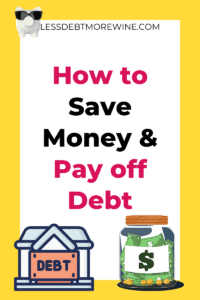Finances With Purpose Paid Off $200k of Student Loan Debt
THIS POST MAY CONTAIN AFFILIATE LINKS. MEANING I RECEIVE COMMISSIONS FOR PURCHASES MADE THROUGH THOSE LINKS, AT NO COST TO YOU. PLEASE READ MY DISCLOSURE FOR MORE INFO.
Happy Tuesday friends! Today I’m super pumped for another installment of the Student Loan Conqueror Series. Student Loan Conquerors is an interview series. I talk with some awesome people tackling their student loan debt head on. Finding out how they are doing it and what inspired them to start in the first place.
If you are interested in participating, please contact me and share a little information about your student loan debt situation.
Today I’m excited to have Mr. FWP from Finances with Purpose sharing how he paid off over $200k of student loan debt. Mr. FWP is a small-town guy with an ivy-league education and professional career who repaid $200,000 in student loans and now encourages others to improve their own finances and achieve greater purpose in life at his blog, www.financeswithpurpose.com.
Now on to the interview!
When did you graduate and with what degree?
I graduated a few years ahead of Liz, before the boom turned into a bust. I have a bachelor of arts degree from a fancy private school and a graduate degree too.
Thankfully, both schools gave me significant scholarships, and I graduated from college without any debt (thanks especially to my parents) through a combo of parents, scholarships, and working throughout. My debt all came from graduate school.
What was the maximum amount of student loans you owed and where do you stand now?
My loans maxed out at (balance-wise) around $166,000, maybe a little more. It’s the interest that kills you, though; I was extremely aggressive and yet still repaid $200,000.
Today, I owe $0. No more loans: no car loans, house loan, student loan. No loans. I held a huge party once the loans were repaid and haven’t looked back since.
If there’s one thing I learned, it’s that debt can be bondage, and we should all work to be free.
How Long did it take to pay off your student loans?
It took over five years altogether to repay my loans, although the last three years made all the difference. For the first two years, the loans were accumulating interest faster than I was able to repay (thanks, low-paying jobs), so the amount I owed actually increased.
But from then on, it took about three years to repay to the point where I had enough money left in the bank to pay them fully anyway – which felt freeing. That allowed me to make some great life changes. It then took another year before they were finally, officially, fully paid off. Then it was party time!
When did you start to focus on your student loans and what motivated you to do so?
After I graduated. Before long, loan statements arrived and I had to look them all up and put it all in a spreadsheet so I could keep track: I had 10 loans and owed more than $150,000. It hit home once I put it all on paper.
I remember when it really sunk in, too: one night, I visited a friend for a house party at her new house that she and her husband had bought. She informed me that it had cost $150,000 – or less than my entire degree. I could have bought a house. From then on, I referred to the debt as “my mortgage” among friends.
By then, the economy had tanked and I realized how much of an anchor the loans were. Many of my friends lost jobs, took pay cuts, or had jobs delayed; their debts continued to accrue. (Many are still repaying it to this day.) I had a problem: I worked for the man, meaning I made very little, so I couldn’t even afford basic payments until I began a corporate job several years into my career. Plus, I carried a car loan, too.
For me, motivation came from the desire to be free and to be able to live life and make choices without taking debts into account. Without loans, I could take a new job (I did so once they were repaid), travel, and do other things more easily.
Related: Paying Off Debt While Pursuing Big Crazy Dreams
I began by knocking out the car loan as quickly as possible – even though some of my student debts were higher – because at least I could keep the car once I paid for it, and I knew I would need another car someday. Then I tackled the smallest loan – it felt good to pay one off – and the huge high-rate monsters.
Related: 5 Steps to Paying Off Debt
What is the one action you’ve taken that has made the biggest difference in your finances?
It may sound cliché, but Dave Ramsey says his entire operation merely applies biblical principles to money and management – and it works beyond our imagination. That’s what I do, too, and I’ve found incredible wisdom that’s easy to apply in the modern world.
For instance, Proverbs says that the “borrower is slave to the lender,” and we’re told it’s best to avoid bondage. Anyone who has student loans knows this is true: student loans are the most enslaving kind of debt you can have. The lender holds terms over you, has all the power, and can treat you unfairly and leave you with little recourse. (Anyone who has debts has likely experienced this in at least a small way.)
I have yet to find a single situation where there’s not an excellent and time-tested biblical principle to apply. The modern world may seem complicated, but the wisdom recorded ages ago applies with every bit as much value.
(editors note: if you aren’t particularly religious or practice another religion, then you can find similar time tested bits of wisdom laid out in the book The Richest Man in Babylon.)
Did you ever consider refinancing/ consolidating? Did you go through with either, why or why not?
Now, debtors have far better options. Professionals may receive better rates, and companies compete for your refinancing business (at least currently). One could argue about whether that’s wise for the government’s balance sheet, but it’s nice for borrowers. Just be sure to read the fine print and find out what happens with your loan benefits, interest rates, and so on!
Plus, the government rounded up your interest rate. You could no longer pay back higher-rate loans faster, either. The government was giving out really bad financial deals, and they were the only game in town. If I consolidated, I lost my benefits, paid a higher rate, paid more, and had to pay them all the same. The government only offered “one simple payment,” but I would save thousands of dollars by paying each loan on my own, so that’s what I did. The government offered no real upside, only downside.
Sure, but it was a terrible idea then. Only the federal government consolidated loans back then, and I learned that if you consolidated, you lost all of your loan benefits! Instead, I wanted to receive future interest-rate breaks, free final payments, and so on. Some loans drop your interest rates after you make 12, 24, or 48 on-time payments. Others wrote off the last six on-time payments. (Those ended up saving me $5,000 or more, and probably much more.)
Recommended Refinancing Company
If you have private loans or your debt to income ratio allows, consider refinancing with a company like SoFi. Learn more about what it’s like to refinance with Sofi. Refinancing my bar loan with SoFi ended up saving me over $1,000. Use my link to refinance your student loan and you’ll get a $100 bonus.
Consolidating may be a very bad idea, or, you may be able to get a sweet deal. In general, I wouldn’t bother unless there’s a substantial reduction in interest rates.
(editor’s note: When you consolidate federal loans with a Direct Consolidation Loan, you end up with an average weighted interest rate, so the interest rate will be higher for some loans and lower for others. You also will retain the benefits associated with Federal Student Loans such as Income-Driven Repayment Plans)
Related: Consolidating or Refinancing? Which is right for you?
What is the best piece of financial advice you’ve received?
To get started, Dave Ramsey offered a course once and I thought it would be good to learn about things like insurance, which I wanted to know more about. But that’s when I began budgeting seriously and learned how to plan for my financial future. Back then, I was allowing my resources to control me, rather than deciding what to do with my resources and taking charge.
My parents then took the course too. My dad’s response to it: “If I had done this at your age, I would be a millionaire now.” Instead, they eliminated what little debt they had and saved; they’re now doing much better as a result.
Related: 8 Methods to Help You Start Building Savings Today
Since then, I’ve learned to apply biblical principles to my financial decisions and to continue budgeting (making plans) and following the budget. The world is complicated, but simple biblical principles can make financial decisions much clearer. Dave’s course contains a lot of that, but you can also find it elsewhere.
After that, I attacked my debt vigorously, and within a few years, I was debt-free. I saved thousands of dollars by paying a little more attention and now I save and invest using those same principles.
What is one piece of advice you would give to others paying down student loans?
I could go on and on about paying loans…but I’ll start here: assess your situation, make a plan, and then act on it. Take small steps first.
I’m the worst at making these huge ambitious goals and then losing steam as I realize how hard they are to climb. I do it with fitness goals, financial goals, you name it. Don’t be like me. With debt, make small goals, then hit them. (Thankfully, I did so with student loans, and that’s probably the only reason it worked as well as it did!)
Make small goals. Make goals that are easy – goals that you can kill. Then keep getting more ambitious with them. Make a little chart, or a number, or something you can see – and put it somewhere you see it every single day. I posted a little cutout picture of the spreadsheet listing all of my loan balances right above my work phone, so I looked at it every single day in the office. My coworkers thought it was strange (the few who noticed) but I’m now debt-free, far ahead of most of them, and on to better things.
Maybe you’re like my wife, and you hate numbers, so if that’s you, pick a super-easy, simple goal, like paying $100 or $1,000 on a given loan. You’ll know when you hit it and you won’t have to calculate a thing. Anyone can do it.
Beyond that, I could give a lot of more advanced suggestions for those in the fight – in fact, I created a list of tips I wish I had known here, in more detail. In short: know your terms, police them, call your lenders, be nice, take notes, ask for discounts, and be proactive. Those tips saved me thousands of dollars.
If you could do it all over again, would you? Why or why not?
No. The borrower is slave to the lender, and loans are a form of bondage – the bigger they are, the more stressful they are, and the larger your burden is. Nobody worries about a $10 debt, but everyone worries about a $10,000 or $100,000 debt.
I have been beyond blessed to repay mine as quickly and easily as I have, despite market troubles, and to the outside world, I am viewed as a smashing success. My school even wanted to publish about me.
But I would never recommend that anyone take this path. Ever.
Several years after graduation, a colleague surveyed all the recent graduates in our office: what would we say to someone considering the same path? Answer, from each and every one of us: “Don’t.” Loans work like an anchor that you carry around with you. And, in general, jobs will only pay you those crazy salaries – that allow you to pay down the loans quickly – if you’re willing to be an indentured servant and work all kinds of hours, with all kinds of stress.
So no, no way. I don’t live with any regret – everyone makes mistakes, and there’s forgiveness – but I would make different choices now. To begin with, I would find a way to get my education without the financial albatross.
In fact, I turned down an offer to a very prestigious graduate school (for another) that offered me a full ride if I would simply defer for a year and start one year later. I was young, didn’t like school, and wanted to get on with life, so I said no…but then carried the stress of loans around for years.
Are you actually utilizing your degree? If not, why not?
Yes, to this day, and thanks to Liz for asking a great question: for a while, most law students, for instance, went back into the fields they came from rather than using their degrees. I know other professional students did the same. One of my former doctors now designs iPhone apps, for instance. Many of my friends returned to what they were doing before graduate school, and as the years go on, many more students I know leave their main field for another.
Looking back, it’s incredible how quickly/easily so many students choose a career path, and how little time we all spent learning critical things about ourselves that would help us find a path that could be rewarding emotionally, spiritually, and financially.
If I could go back, I would spend time doing two things: first, I would spend serious time considering how I might best employ my gifts and abilities in ways that are fruitful in the marketplace. Who am I – what am I uniquely designed to do (right now)? And what jobs would allow me to be who I am?
One day, I stumbled upon this TED talk, which led to this book, Now What: 90 Days to a New Life Direction. I can’t recommend it enough to anyone considering what to do with his or her life. The exercises are invaluable – they help you learn more about who you are in ways that you can then apply to the working world. I’ve used it to guide my career path and am reaping dividends from it. In fact, it’s part of the reason I even began blogging – I’m a person who loves learning about living well, honoring God, leading well, and then passing it along to others.
I say all of that to say: I wish I had spent more time learning about myself and what occupations would fit before launching my journey. For me, life worked out well nonetheless: I’m able to do much of what I want to do with the general direction I have chosen, but it could have worked out much better and much quicker had I done my homework sooner.
Anything you’d like to share with LDMW readers?
You can do it! You can beat debt. Start small, set small goals, and achieve. I’ve witnessed a homeless person completely turn her life around by applying basic financial principles. If she can do it, believe me, anyone can.
On that note, check out the Bible’s wisdom on resources and relationships. It continues to guide me well, and the wisdom in it applies just as well to our modern world as it did to the ancient world. Borrowers are still slaves to lenders. Sluggards still don’t do well in life. Diversification is still key to investing.
Finally, see my last answer, above: spend time learning about how to employ yourself in ways that honor your values, talents, gifts, and create value in the marketplace. I wish I had done that years ago.
Maybe do some aptitude testing, too, but at least seriously consider the topic. It will reap dividends now and for years to come. If any of you are still in school, then you especially want to run through those things. Or if you’re considering other directions, other careers, and so on. It may even help you find some fun hobbies – it has for me.



Thanks again to Liz for hosting my story! Hopefully it encourages others: your debt is conquerable. I’m happy to respond to any comments/questions here, too! -Mr. FWP
Thanks for participating, it’s been great to have you as part of the series!